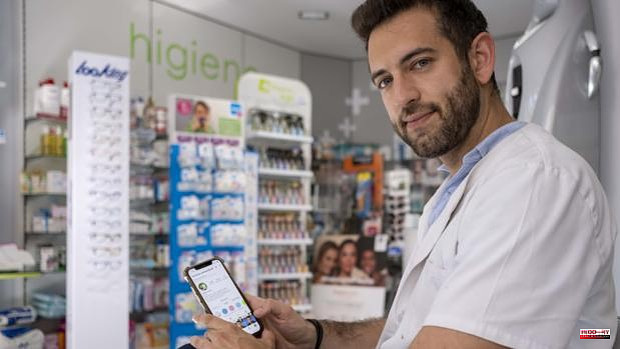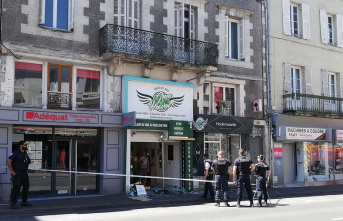The pharmacist Guillermo Martín Melgar (Salamanca, 1990), behind the profile of 'Farmacia Enfurecida', grows in social networks thanks to his acid criticism, based on humor, with which he dedicates himself to dismantling hoaxes, combating misinformation and refuting other 'influencers' who dare to recommend drugs to their followers, many of them young. After publishing two graphic novels, 'This pharmacy is a cross' and 'This pharmacy needs a prescription', the young apothecary from Salamanca, who works in the capital of Tormes, continues to increase his presence on the Internet, where he accumulates almost half a million followers adding all his accounts. During an interview with Ical, Martín Melgar reviews his career, warns about the dangers lurking in the network from a pharmacological point of view, and proposes the changes that he considers necessary to improve the supply of medicines in this country.
- How does a young Pharmacy student decide to open a window to the world through the Internet?
- There really was no planning. I was at the Faculty studying, I was bored, and I thought of telling the day-to-day life of Pharmacy students. It was the time of the Bologna plan and others. That pleased the rest of the classmates. Later, I finished my degree, I went to work and started telling things about the pharmacy. Then the public began to claim me and I realized that I had opened myself up to a greater target within the pharmaceutical field. They asked me for anecdotes, mostly. And I began to transfer the daily life of the pharmacy with a touch of ironic humor, which I think is what most characterizes the account. In the end, I have ended up opening up, not only to pharmacists, but to the general public. And this very happy. I do very well.
- Have you been surprised by the growth of your accounts on social networks?
- Everything has been gradual and progressive. Yes, it is true that I am a little surprised at every step. Some of them have been bigger than others. For example, when I opened the 'TikTok' profile I suddenly gained over 200,000 followers in a matter of two weeks. That was a very important step. Most of the steps have been small, because everything has been very gradual, but then there have been big leaps, like that one, or publishing the books that, you want or not, is a career advancement.
- What conclusions can be obtained by someone approaching one of your books for the first time?
- My intention, both with the books and with the social network accounts, is to bring the world of pharmacy closer to the general public. So what you are going to find up front is, precisely with that, with what a pharmacy is from the inside, with its pluses and minuses. Because I think that people still don't know very well everything that a pharmacy implies, how it works inside and what can be done in it. Readers find the description of a pharmacy full of anecdotes and humor.
- After the publication of these two humorous graphic novels, what would you say is the funniest story that crowns your anecdote?
- Surely, when they asked me for oral sex at the pharmacy. Of course, what they wanted was oral serum. Imagine the laughs. In the comic, faces are better seen to make humor and I try to make everything funnier.
- Someone who writes books but who also uses networks, what importance do you give to the different types of language?
- What I have always liked, since before social networks, is writing. So I started on Twitter, which is the social network for writers, and then I've been adapting to other networks, like Instagram, with images, or TikTok, with videos. That is why I have been evolving and adapting my forms of communication. But really what I have always liked is writing, so we can say that thanks to social networks I have ended up fulfilling my dream. But it's what I know how to do.
- One of the issues that most concerns you lately is that there are 'influencers' who are recommending the intake of certain drugs through social networks. To what extent is this dangerous?
- The social networks do too many crazy things with medicines. The last thing I saw out there was some guys giving Viagra to their peers as a joke. Many silly things are done on social networks and some of them are related to health, more specifically to medications. This is the case of 'influencers' who recommended, and continue to recommend, drugs.
- In times of pandemic, how do you fight against certain denialisms?
- It is very complicated because false information is shared much faster than true information. I fight, as I have always done, with humor. I think that if you don't add humor to scientific information to combat a hoax, four people will read it. But if you tell a joke or get that message to go 'viral', in the end you can end up fighting it. That is why I would say that always with humor, even if they are sensitive issues.
- Do you consider yourself a fighter against magical thinking?
- Not exactly a fighter, but I do act as a comedian against those people. I try to combat hoaxes and nonsense that are heard every day everywhere.
- There are certain consumers who have confidence in homeopathic treatments, what do you think about them?
- I'm against homeopathy. I defend natural remedies, but phytotherapy type. The other is not in my plans.
- How has the role of the pharmacist evolved in recent times, especially since the pandemic?
- Before we were already a benchmark for citizens in terms of health and, now, I think even a little more. We have been open 24 hours and have not closed a single day. When people were afraid and uncertain about health issues and the health centers were full, they came to the pharmacy. That is why I think that the figure of the pharmacist has come out a little reinforced for the public.
- Even so, do you think it is convenient that, in a province like Salamanca, the only health contact that there is in some municipalities is that of the pharmacist?
- No, in the sense that it would be good if medicine and health issues were easily accessible to everyone. It is also true that in towns with low population density and that are now emptying out it is quite difficult to have a doctor, or even a pharmacy in the municipality.
- Many people see pharmaceutical companies as the bad guy in this movie. Where should the line be between business and public service?
- It's a little more complicated. Pharmaceutical companies are a business and what they want is to make money. Like the food industry or the textile industry. They always pull towards themselves. This is so. Another thing is that we have a public system that is putting the brakes on it. And that is what they have to do.
- What do you think of all those people who harbored greater fear of the vaccine than of the virus itself?
- On the subject of vaccines there are many people who do not have much knowledge on the subject and dare to venture things. The world of pharmacy, although it may not seem like it, is a very complex issue. Especially, the creation and supervision of vaccines. The media explain it in a simple way and, later, people think they know and start talking. This is mixed with the great misinformation that has been, which has been completely orchestrated, and hunger has been combined with the desire to eat. On the one hand, that man who has no idea but thinks he does and, on the other, people who are convincing him with super secret alternative versions and that he doesn't even understand, but that he repeats to seem interesting.
- How could the supply of drugs to the population and the pharmaceutical system in this country be improved?
For example, we could be given more resources to communicate with doctors. Especially when it comes to renewing recipes. We have people completely dizzy. It is not normal that to renew a prescription we are 15 days because people run out of medicines. That would be very simple. And that they grant us some more competence, as in other countries, to detect issues such as urine infection through tests. Pharmacies could remove a lot of burden from primary care, but they won't let us.












